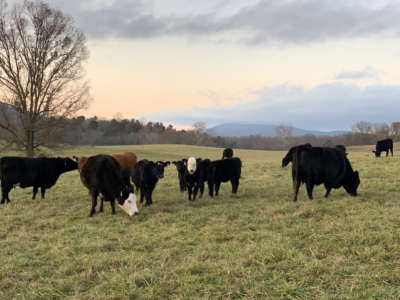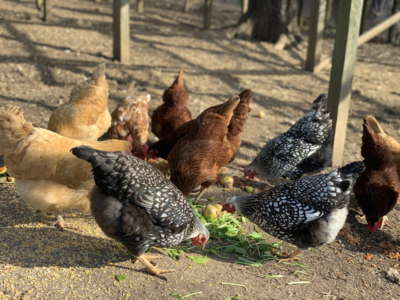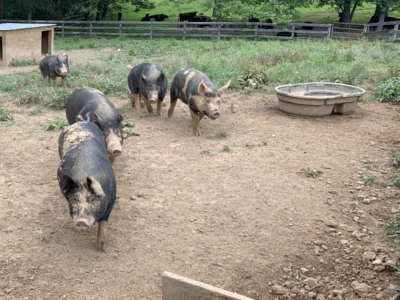Our Farm
Here in the heart of the beautiful Virginia Piedmont, we set out to create a farm that upholds the highest environmental standards while supporting the native ecology and wildlife. You can see it in every aspect of Chancellors Rock -- from the way we improve the soil in our pastures by rotationally grazing our cattle, to the French intensive methods we employ in the raised beds of our Kitchen Garden. Following industry best practices for sustainability, we also raise ducks, free-range chickens, and heritage breed pigs in our pastures.
OUR FREE-RANGE LIVESTOCK

Our Black Angus and Herefordshire cattle are grass-fed; over the last three months of growth, we supplement their feed with grain to increase marbling.

Free-range Wyandotte, Rhode Island Red, Orpington and hybrid chickens feed in our gardens and pastures.

Our heritage breed pigs – Berkshires, Tamworths, Gloucester Old Spots and Large Blacks – are pasture-raised and able to forage in the woods.
PROMOTING SUSTAINABILITY AND BIODIVERSITY
Our fields thrive with the aid of recycled nutrients, not environmentally dangerous fertilizers. We strategically graze our cattle and enrich our soils with organic materials to promote better grass growth. What’s more, our cattle aren’t fed antibiotics or given growth implants; the beef we sell comes from cows that have spent their lives ranging freely in pastures eating grass, pure and simple.
Chancellors Rock is proud to partner with the American Farmland Trust in their Sustainable Grazing Program; we passionately believe in demonstrating the environmental benefits of an approach far different from how cattle typically have been grazed. By rotating the cattle frequently among smaller areas of pasture, the cows graze in a controlled manner and manure is spread more evenly. Pastures are allowed to rest, the root systems of the grasses are strengthened, and the soil is improved with greater micro-biodiversity.
BETTER GRASS, BETTER CARBON STORAGE
This method of grazing results in stronger growing grass that requires no synthetic fertilizers for nourishment. In addition, the Chancellors Rock pastures are available for grazing longer during the winter, significantly decreasing our dependence on hay. A final benefit is a reduced carbon footprint; studies have shown that grasses in sustainably grazed, holistically managed pastures can sequester enough carbon to offset the emission from an entire farm.
MEADOWS VIBRANT WITH WILDLIFE
By practicing sustainable grazing pasture management, we use fewer acres for hay production, which means grass grows longer and we can delay mowing until after the nesting season of birds such as the Eastern Meadowlark. We’ve set aside acres of natural meadows on the property to provide food and cover for bird, pollinators, and other species. In partnership with Virginia Working Landscapes, we are studying and documenting how our practices support local wildlife.









